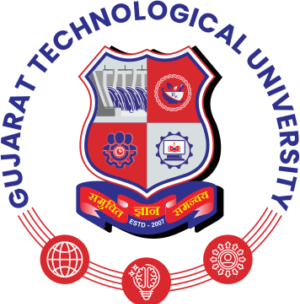 Mobile has emerged as truly pervasive and affordable Information and Communication Technology (ICT) platform in the last decade. Mobile Communication and Network Technology post graduate program focuses on strong fundamentals and on developing hands-on skills pertaining to the latest and most popular platforms like Symbian, Android, Windows Mobile. Students will gain knowledge in wireless technologies, such as Bluetooth, Wi-Fi, GPRS, EDGE, 3G, LTE, 4G, 5G and new future innovations. Students will be trained not only to use existing mobile platforms but also to build advanced and robust platform.
Mobile has emerged as truly pervasive and affordable Information and Communication Technology (ICT) platform in the last decade. Mobile Communication and Network Technology post graduate program focuses on strong fundamentals and on developing hands-on skills pertaining to the latest and most popular platforms like Symbian, Android, Windows Mobile. Students will gain knowledge in wireless technologies, such as Bluetooth, Wi-Fi, GPRS, EDGE, 3G, LTE, 4G, 5G and new future innovations. Students will be trained not only to use existing mobile platforms but also to build advanced and robust platform.
The students will learn the latest and popular subjects like Internet of Things, Advanced Computer Networks, RF and Antenna Designing, Embedded Technology, Wireless Sensor Networks, Advanced Digital Signal Processing etc.
Advanced elective courses in other allied domains such as information security and biometrics also will be included to prepare students for some of the future areas in mobile computing like possible security attacks, high speed mobile network security and defence mechanism in the mobile domain.
Career Opportunities in MCNT
 Students are competent enough to analyze, synthesize, design & propose new mobile Communication architecture which may have good social impact in form of products in recent communication era. Students are also skilled enough to develop their carrier in companies like Vodafone, ISRO, Jio Telecom, Ericsson, Nokia, Siemens, Cisco etc.
Students are competent enough to analyze, synthesize, design & propose new mobile Communication architecture which may have good social impact in form of products in recent communication era. Students are also skilled enough to develop their carrier in companies like Vodafone, ISRO, Jio Telecom, Ericsson, Nokia, Siemens, Cisco etc.
This AICTE approved Post Graduate ME course of two years duration has an intake of 30 students per year and the admissions are done through ACPC, Gujarat on the basis of PGSET/GATE and the score at BE.
Program Outcomes
- An ability to independently carry out research /investigation and development work to solve practical problems.
- An ability to write the present substantial technical report/documents.
- Students should be able to demonstrate a degree of mastery over the area as per the specialization of the program. The mastery should be at a level higher than the requirements in the appropriate bachelor program.
Program Specific Outcomes
- Understand, design and implement emerging technology in the field of mobile communication and network technology.
- To analyze real time problems, design appropriate system to provide solutions which are technically sound, cost effective and beneficial to the society in mobile communication and network technology.
- To furnish with necessary soft skills, managerial skill, analytical skills to work in the software and hardware industry
Program Educational Objectives
- Engage in the effective practice of communication and networking engineering to recognize and solve important tribulations in a diverse range of application areas.
- Involve in research with proficiency in core areas of advanced communication and networking related engineering so as to comprehend engineering trade-offs, analysis, design and technical concepts to create novel solutions for the real life problems.
- Occupy constructively in successful careers in industry, academia and attain positions of importance where they have an impact on their business, profession, and community service with ethics.
- Competent enough in any challenging and dynamic environment communicate effectively in variety of professional context and incorporate government societal and industrial need.
The Mobile Communication and Network Technology department has good infrastructure and well-equipped laboratories with qualified support staff supervised by well qualified, experienced and committed faculty members who are seasoned researchers.
Wireless Sensor Networks (WSN) Laboratory:
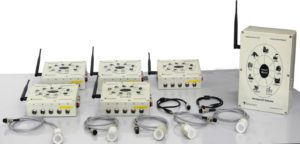 The Wireless Sensor Networks (WSN) Lab hosts a state-of-the-art experimental academic and research facility for WSN. The test-bed facility is used for the prototyping and evaluation of developed protocol solutions and serves as a basis for the development of novel mobile context aware services and applications. The test-bed consists of wireless sensor and actuator nodes that can be organized in different network topologies and individually configured for various experiments and uses the backbone infrastructure of the Wireless Network Test-bed.
The Wireless Sensor Networks (WSN) Lab hosts a state-of-the-art experimental academic and research facility for WSN. The test-bed facility is used for the prototyping and evaluation of developed protocol solutions and serves as a basis for the development of novel mobile context aware services and applications. The test-bed consists of wireless sensor and actuator nodes that can be organized in different network topologies and individually configured for various experiments and uses the backbone infrastructure of the Wireless Network Test-bed.
Mobile Communication Laboratory:
In mobile communication laboratory there is a GSM mobile trainer kit and and 4G VOLTE smart phone trainer kit are available in department. In this laboratory students can expose experimental work for GSM, CDMA and mobile communication performance. Research facility is also available for adhoc wireless network and network range related issue
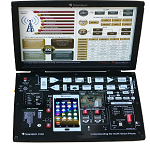 Understanding of 4G VoLTE Smart Phone Trainer : 4G VoLTE Smart Phone Trainer is an ideal product for today's global technical professional. One of the main features of this kit is its real time operation and observation of signals/voltages. This kit introduces the user to the fundamental of 4G Dual SIM VoLTE mobile equipment and clears the concept underlying VoLTE technology in simple way. The touch screen display, SIM sockets and user interface section of Smart Phone i.e. Vibrator, Buzzer, Microphone, Speaker, Hands free port and camera have been exposed on board with switched faults creation facility and test points for signal study. Another attractive feature is that user can make android application and IoT related application development. Its enriched product tutorial containing useful technical information will help user in creating a full understanding of 4G Dual SIM VoLTE Smart Phone
Understanding of 4G VoLTE Smart Phone Trainer : 4G VoLTE Smart Phone Trainer is an ideal product for today's global technical professional. One of the main features of this kit is its real time operation and observation of signals/voltages. This kit introduces the user to the fundamental of 4G Dual SIM VoLTE mobile equipment and clears the concept underlying VoLTE technology in simple way. The touch screen display, SIM sockets and user interface section of Smart Phone i.e. Vibrator, Buzzer, Microphone, Speaker, Hands free port and camera have been exposed on board with switched faults creation facility and test points for signal study. Another attractive feature is that user can make android application and IoT related application development. Its enriched product tutorial containing useful technical information will help user in creating a full understanding of 4G Dual SIM VoLTE Smart Phone
Internet of Thing Laboratory:
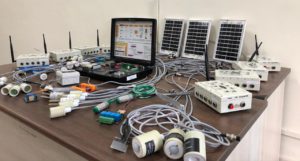 IoT-LAB is a part of the future Internet of the Thing) platform. It is a set of complementary components that enable experimentation on innovative services for academic and industrial users. The project gives students a way to experiment on mobile wireless communications to the network and on application layers, thereby accelerating the design of advanced networking technologies for the Future Internet.
IoT-LAB is a part of the future Internet of the Thing) platform. It is a set of complementary components that enable experimentation on innovative services for academic and industrial users. The project gives students a way to experiment on mobile wireless communications to the network and on application layers, thereby accelerating the design of advanced networking technologies for the Future Internet.
Objective of Internet of Things (IoT) Laboratory is to perform and verify various concept of IoT as per the course curriculum, development of various IoT applications by our PG Students, and investigation of new technologies, algorithms for future demands. In the laboratory, following resources are available.
Computer network Laboratory:
Computer networks form an integral part of a computer science and engineering graduate, they learn different types of network topologies, management commands, OSI model, various protocols and their implementation. In this lab, students demonstrate the operation of networks and its management commands using network simulation tool i.e, NS2. They also find the performance of GSM and CDMA wireless networks. In this lab they implement the Data Link Layer and Transport Layer protocol.
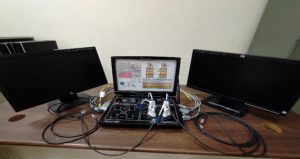 Understanding of Local Area Network : Understanding of Local Area Network (LAN) kit provides the understanding of all the fundamentals of networking. It helps the users to gain knowledge on all network layers, cable designing and building of complete network of computers. The users can understand and actually implement various topologies using different standards given by IEEE. Actual connections can be made in different topologies and data can be transferred. The users will understand the protocols, topologies used in networking, measurement of error rate, throughput and effect of errors on protocols. The versatile software provided with kit will assist the users to observe the various effects and configurations on network along with the graphical representation.
Understanding of Local Area Network : Understanding of Local Area Network (LAN) kit provides the understanding of all the fundamentals of networking. It helps the users to gain knowledge on all network layers, cable designing and building of complete network of computers. The users can understand and actually implement various topologies using different standards given by IEEE. Actual connections can be made in different topologies and data can be transferred. The users will understand the protocols, topologies used in networking, measurement of error rate, throughput and effect of errors on protocols. The versatile software provided with kit will assist the users to observe the various effects and configurations on network along with the graphical representation.
Other than above laboratories there is MATLAB licence software and some open source software are utilized for simulation purpose for the subjects of optical communication, advanced computers Network, antenna design and advanced digital signal processing.
| Subject Code | Branch code | Subject Name | Category | Semester | L | T | P | Credit | E | M | I | V | Total Marks |
|---|---|---|---|---|---|---|---|---|---|---|---|---|---|
| 3700001 | 60 | English for Research Paper Writing | Audit Course | 1 | 2 | 0 | 0 | 0 | 50 | 0 | 0 | 0 | 50 |
| 3700005 | 60 | Constitution of India | Audit Course | 1 | 2 | 0 | 0 | 0 | 50 | 0 | 0 | 0 | 50 |
| 3710001 | 60 | Research Methodology and IPR | MLC | 1 | 1 | 0 | 2 | 2 | 0 | 0 | 20 | 80 | 100 |
| 3710508 | 60 | Wireless and Mobile Communication | Core II | 1 | 3 | 0 | 2 | 4 | 70 | 30 | 20 | 30 | 150 |
| 3710509 | 60 | Optical Networks | Program Elective I | 1 | 3 | 0 | 2 | 4 | 70 | 30 | 20 | 30 | 150 |
| 3710510 | 60 | Statistical Information Processing | Program Elective I | 1 | 3 | 0 | 2 | 4 | 70 | 30 | 20 | 30 | 150 |
| 3710513 | 60 | Cognitive Radio | Program Elective II | 1 | 3 | 0 | 2 | 4 | 70 | 30 | 20 | 30 | 150 |
| 3710514 | 60 | RF and Microwave Circuit Design | Program Elective II | 1 | 3 | 0 | 2 | 4 | 70 | 30 | 20 | 30 | 150 |
| 3710515 | 60 | DSP Architecture | Program Elective II | 1 | 3 | 0 | 2 | 4 | 70 | 30 | 20 | 30 | 150 |
| 3712708 | 60 | Advanced Communication Networks | Core I | 1 | 3 | 0 | 2 | 4 | 70 | 30 | 20 | 30 | 150 |
| 3712707 | 60 | Antennas and Radiating Systems | Program Elective I | 1 | 3 | 0 | 2 | 4 | 70 | 30 | 20 | 30 | 150 |
| 3700001 | 60 | English for Research Paper Writing | Audit Course | 2 | 2 | 0 | 0 | 0 | 50 | 0 | 0 | 0 | 50 |
| 3700005 | 60 | Constitution of India | Audit Course | 2 | 2 | 0 | 0 | 0 | 50 | 0 | 0 | 0 | 50 |
| 3720001 | 60 | Mini Project with Seminar | Core | 2 | 0 | 0 | 4 | 2 | 0 | 0 | 100 | 0 | 100 |
| 3720506 | 60 | Satellite Communication | Program Elective III | 2 | 3 | 0 | 2 | 4 | 70 | 30 | 20 | 30 | 150 |
| 3720514 | 60 | IOT and Applications | Program Elective III | 2 | 3 | 0 | 2 | 4 | 70 | 30 | 20 | 30 | 150 |
| 3720515 | 60 | Software Defined Networks | Program Elective III | 2 | 3 | 0 | 2 | 4 | 70 | 30 | 20 | 30 | 150 |
| 3720517 | 60 | Markov Chain and Queuing System | Program Elective IV | 2 | 3 | 0 | 2 | 4 | 70 | 30 | 20 | 30 | 150 |
| 3720518 | 60 | MIMO System | Program Elective IV | 2 | 3 | 0 | 2 | 4 | 70 | 30 | 20 | 30 | 150 |
| 3720519 | 60 | Embedded Wireless Technology | Program Elective IV | 2 | 3 | 0 | 2 | 4 | 70 | 30 | 20 | 30 | 150 |
| 3722711 | 60 | Wireless Sensor Networks | Core III | 2 | 3 | 0 | 2 | 4 | 70 | 30 | 20 | 30 | 150 |
| 3722712 | 60 | Advanced Digital Signal Processing | Core IV | 2 | 3 | 0 | 2 | 4 | 70 | 30 | 20 | 30 | 150 |
| 3730002 | 60 | Internal Review 1 | Internal Review 1 | 3 | 0 | 0 | 4 | 2 | 0 | 0 | 100 | 0 | 100 |
| 3730003 | 60 | Dissertation Phase I | Dissertation | 3 | 0 | 0 | 16 | 8 | 0 | 0 | 0 | 100 | 100 |
| 3730005 | 60 | Business Analytics | Open Elective | 3 | 3 | 0 | 0 | 3 | 70 | 30 | 0 | 0 | 100 |
| 3730007 | 60 | Operation Research | Open Elective | 3 | 3 | 0 | 0 | 3 | 70 | 30 | 0 | 0 | 100 |
| 3730505 | 60 | High Performance Networks | Program Elective V | 3 | 3 | 0 | 0 | 3 | 70 | 30 | 0 | 0 | 100 |
| 3730506 | 60 | Pattern Recognition and Machine learning | Program Elective V | 3 | 3 | 0 | 0 | 3 | 70 | 30 | 0 | 0 | 100 |
| 3730507 | 60 | Remote Sensing | Program Elective V | 3 | 3 | 0 | 0 | 3 | 70 | 30 | 0 | 0 | 100 |
| 3740001 | 60 | Internal Review - 2 | Dissertation | 4 | 0 | 0 | 4 | 2 | 0 | 0 | 100 | 0 | 100 |
| 3740002 | 60 | Dissertation Phase II | Dissertation | 4 | 0 | 0 | 28 | 14 | 0 | 0 | 0 | 100 | 100 |
| Subject Code | Branch code | Subject Name | Category | Semester | L | T | P | Credit | E | M | I | V | Total Marks |
|---|---|---|---|---|---|---|---|---|---|---|---|---|---|
| 3700004 | 60 | Value Education | Audit | 1 | 2 | 0 | 0 | 0 | 50 | 0 | 0 | 0 | 50 |
| 3710001 | 60 | Research Methodology and IPR | MLC | 1 | 1 | 0 | 2 | 2 | 0 | 0 | 20 | 80 | 100 |
| 4716001 | 60 | Advanced Digital Communication Techniques | Core -I | 1 | 3 | 0 | 2 | 4 | 70 | 30 | 20 | 30 | 150 |
| 4716002 | 60 | Advanced Wireless Communication | Core -II | 1 | 3 | 0 | 2 | 4 | 70 | 30 | 20 | 30 | 150 |
| 4716003 | 60 | High Frequency CMOS Circuit Design | Program Elective -I | 1 | 3 | 0 | 2 | 4 | 70 | 30 | 20 | 30 | 150 |
| 4716004 | 60 | Embedded System Design | Program Elective -I | 1 | 3 | 0 | 2 | 4 | 70 | 30 | 20 | 30 | 150 |
| 4716005 | 60 | Optical Communication and Networks | Program Elective -I | 1 | 3 | 0 | 2 | 4 | 70 | 30 | 20 | 30 | 150 |
| 4716006 | 60 | Artificial Intelligence in Communication | Program Elective -II | 1 | 3 | 0 | 2 | 4 | 70 | 30 | 20 | 30 | 150 |
| 4716007 | 60 | Microwave Integrated Circuits Design | Program Elective -II | 1 | 3 | 0 | 2 | 4 | 70 | 30 | 20 | 30 | 150 |
| 4716008 | 60 | Advanced Digital Signal Processing in Communication | Program Elective -II | 1 | 3 | 0 | 2 | 4 | 70 | 30 | 20 | 30 | 150 |
| 3700001 | 60 | English for Research Paper Writing | Audit Course | 2 | 2 | 0 | 0 | 0 | 50 | 0 | 0 | 0 | 50 |
| 3720001 | 60 | Mini Project with Seminar | Core | 2 | 0 | 0 | 4 | 2 | 0 | 0 | 100 | 0 | 100 |
| 4726001 | 60 | Adhoc Network technology | Core III | 2 | 3 | 0 | 2 | 4 | 70 | 30 | 20 | 30 | 150 |
| 4726002 | 60 | Network Performance Modeling and Analysis | Core IV | 2 | 3 | 0 | 2 | 4 | 70 | 30 | 20 | 30 | 150 |
| 4726003 | 60 | RF System Design | Program Elective III | 2 | 3 | 0 | 2 | 4 | 70 | 30 | 20 | 30 | 150 |
| 4726004 | 60 | IoT Architecture and Applications | Program Elective III | 2 | 3 | 0 | 2 | 4 | 70 | 30 | 20 | 30 | 150 |
| 4726005 | 60 | GPS and Satellite Communication | Program Elective III | 2 | 3 | 0 | 2 | 4 | 70 | 30 | 20 | 30 | 150 |
| 4726006 | 60 | Deep Learning in Communication | Program Elective IV | 2 | 3 | 0 | 2 | 4 | 70 | 30 | 20 | 30 | 150 |
| 4726007 | 60 | Smart Antenna Design | Program Elective IV | 2 | 3 | 0 | 2 | 4 | 70 | 30 | 20 | 30 | 150 |
| 4726008 | 60 | Speech and Image Signal Processing | Program Elective IV | 2 | 3 | 0 | 2 | 4 | 70 | 30 | 20 | 30 | 150 |
| 3730002 | 60 | Internal Review-I | Core | 3 | 0 | 0 | 4 | 2 | 0 | 0 | 100 | 0 | 100 |
| 3730003 | 60 | Dissertation Phase-I | Core | 3 | 0 | 0 | 16 | 8 | 0 | 0 | 0 | 100 | 100 |
| 3730005 | 60 | Business Analytics | Open Elective | 3 | 3 | 0 | 0 | 2 | 70 | 30 | 0 | 0 | 100 |
| 3730006 | 60 | Industrial Safety | Open Elective | 3 | 3 | 0 | 0 | 2 | 70 | 30 | 0 | 0 | 100 |
| 3730008 | 60 | Cost Management of Engineering Projects | Open Elective | 3 | 3 | 0 | 0 | 2 | 70 | 30 | 0 | 0 | 100 |
| 4736001 | 60 | High Speed Networks | Program Elective V | 3 | 3 | 0 | 2 | 4 | 70 | 30 | 20 | 30 | 150 |
| 4736002 | 60 | Wireless Network Security | Program Elective V | 3 | 3 | 0 | 2 | 4 | 70 | 30 | 20 | 30 | 150 |
| 4736003 | 60 | Software Defined Radio Networks | Program Elective V | 3 | 3 | 0 | 2 | 4 | 70 | 30 | 20 | 30 | 150 |
Tokyo
Tokyo is the capital of Japan.
